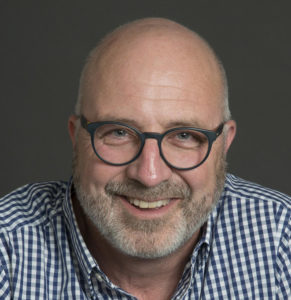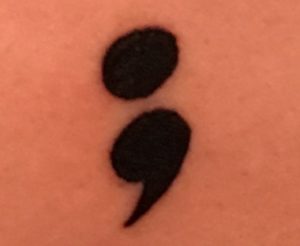 Last week I got a tattoo.
Last week I got a tattoo.
Never thought I’d write that sentence. But this is a tattoo with a purpose – as I suspect many are.
Just imagine this fair-skinned, middle-aged, uncool pastor walking into a tattoo parlor on the hipster stretch of Lower Greenville in Dallas, and you’ll get the image. When I told the artist what I wanted, he asked: “Who is this for?”
“It’s for myself,” I replied.
He asked the question because he was well aware of Project Semicolon, an initiative that brings hope to people who suffer from depression, have struggled with suicidal ideation or have experienced traumatic events that left them in despair. The trademark of this initiative is the semicolon tattoo, which serves as a visible witness to hope, both for the person who struggles or has died and for their family and friends.
The meaning of the semicolon is this: “Your story is not over.” It’s not a period, which ends a sentence; it’s a pause that says there’s more to come.
I got this mark placed on my inner bicep on about the one-year anniversary of when my body started rebelling against me. The story began with increasing neck pain that became excruciating throughout last fall, pain that didn’t respond to conservative therapies and that was so unbearable it left me one step short of being suicidal. Then I had surgery to solve the problem and ended up with a spinal cord injury that immobilized my right arm and hand for months. Then I had an invasive follow-up test that left me with a slow and chronic spinal fluid leak that creates a never-ending headache.
“What injury and illness and depression steal from you most of all is perspective – the ability to understand that there’s more to be written in your story.”
The struggle is to welcome life as it is now, which is certainly different than you thought it would be or should be. The struggle is to see injury and illness and despair as a semicolon and not a period. I put the small tattoo on the arm that failed me, and I put it where I can see it every day as a reminder of how far I’ve come. I think of it as an equivalent to Noah’s rainbow – a beacon of hope.
What injury and illness and depression steal from you most of all is perspective – the ability to understand that there’s more to be written in your story.
If you look at me today, you might not be able to tell that my arm and my hand ache constantly, that my head is throbbing and that I’m sometimes a wreck emotionally and spiritually. It’s not too hard to disguise those things. I’m learning that I need to see what you see in me; otherwise, it’s too easy to fixate on the failures and inabilities that I feel inside. I need to stop imagining a period where there could be a semicolon instead.
Depression has the power to tell you things you know are not true. The other day, I was explaining to a friend the litany of things my brain shouts at me that run counter to my own established theology and ideology: If I had prayed more, I would have been healed; if I were more devout in spiritual practice, I could overcome these trials; if I sat still more, meditated more, worked harder at all this, I would have a different outcome.
As a pastor, I can easily tell other people that these are false and dangerous ideas, that the world doesn’t work that way, that God is not keeping score to bring healing only to the most devout. I know these things are not true, and yet I cannot escape the fear that they are. My friend, who knows depression firsthand, listened to me and said kindly: “That sounds a lot like depression to me.”

The meaning of the semicolon tattoo is this: “Your story is not over.”
Like Martin Luther, I find great encouragement in singing. Luther said Satan hates singing, which is why it is such a good cure. Last Sunday in worship, we sang Luther’s greatest hit, “A Mighty Fortress.” I always find comfort and strength in the third verse: “And though this world, with devils filled, should threaten to undo us, we will not fear, for God hath willed his truth to triumph through us. The Prince of Darkness grim, we tremble not for him; his rage we can endure, for lo! his doom is sure. One little word shall fell him.”
That word – the Word – was begotten, not made, God from God, Light from Light. Jesus, the Word of God, is the Light that cannot be dimmed, a Word that cannot meet its end with a period.
There is, indeed, power in the name of Jesus, and the message of resurrection we need to shout back when the Prince of Darkness comes calling is this: “My story is not over.”
Related column:
For clergy it’s unsettling to realize sometimes the helper needs help
Related feature:
Chronic pain: embracing the journey
